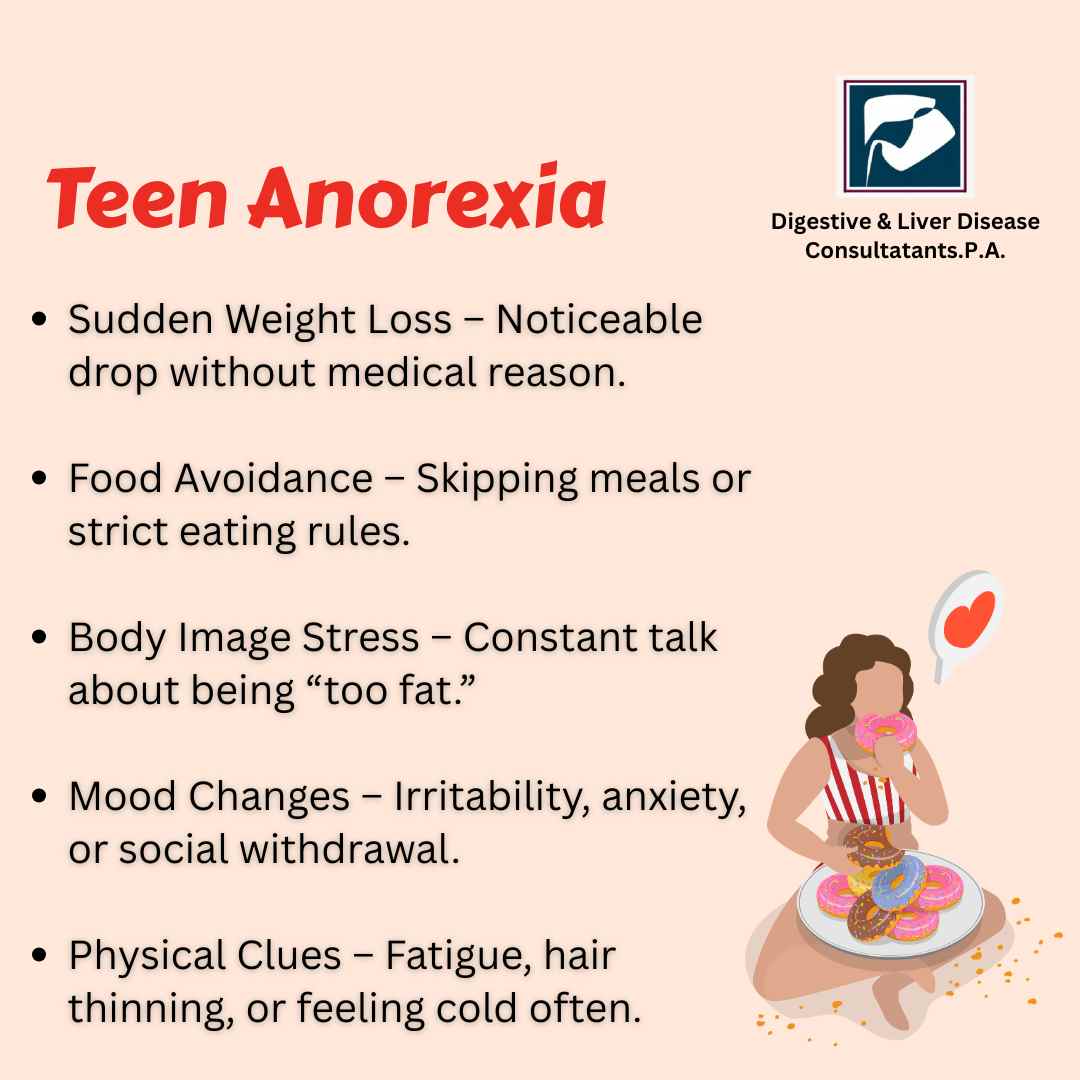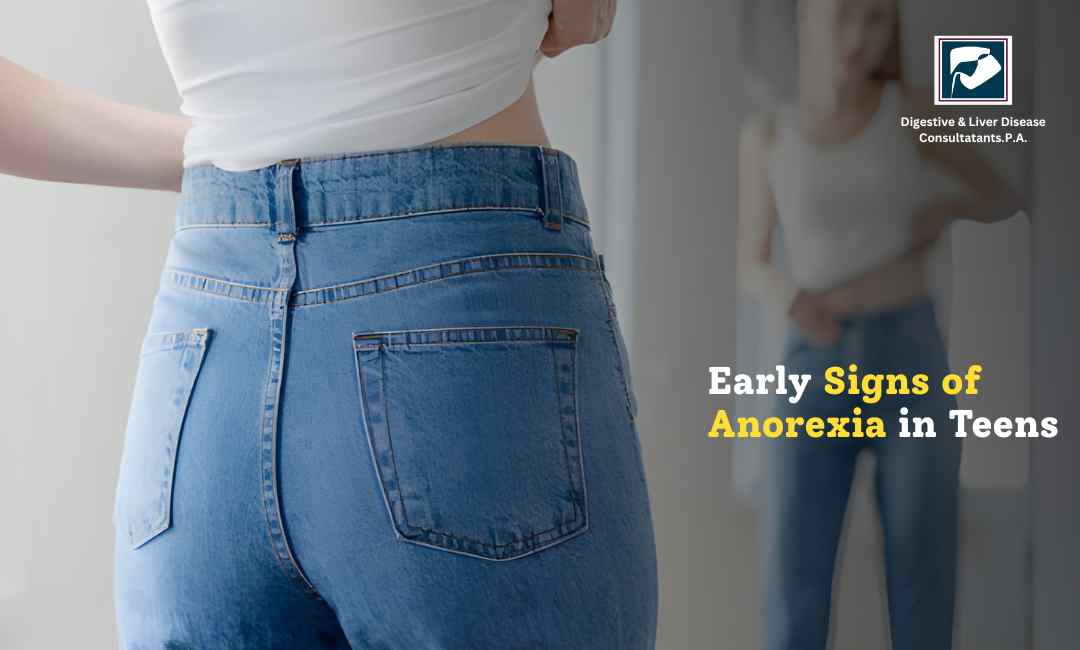Anorexia nervosa, often called anorexia, is a serious eating disorder that affects how a person thinks about food, body image, and self-worth. While it can occur at any age, it most commonly begins during the teenage years. Recognizing the early signs of anorexia in teens is important because early treatment can make a huge difference in recovery and long-term health.
In many cases, the changes start subtly. Parents, teachers, and friends might not notice right away because the signs can look like normal teenage behavior—wanting to eat healthy, exercising more, or trying to lose a little weight. But when these behaviors become extreme, they can lead to severe physical and emotional harm.
Let’s look at the early warning signs of anorexia in teens and what you can do to help.
What Is Anorexia Nervosa?
Anorexia nervosa is a mental health condition that causes people to severely restrict food intake due to an intense fear of gaining weight. Teens with anorexia often have a distorted body image, seeing themselves as overweight even when they are dangerously underweight.
This disorder affects both the mind and body. It can cause hormonal changes, digestive problems, and even damage to vital organs if not treated early.

Early Signs of Anorexia in Teens
1. Drastic Weight Loss or Fear of Weight Gain
One of the most noticeable signs of anorexia is sudden or significant weight loss. Teens may become obsessed with calories, portion sizes, or “clean eating.” Even if they are already thin, they may still express fear of gaining weight or constantly talk about wanting to be smaller.
2. Skipping Meals or Making Excuses Not to Eat
Teens with anorexia often avoid eating with family or friends. They may claim to have already eaten, say they’re not hungry, or pick at their food. Some may push food around their plate to make it seem like they are eating when they are not.
3. Obsession with Food and Dieting
Paradoxically, many teens with anorexia spend a lot of time thinking about food—looking up recipes, watching cooking shows, or talking about what others are eating—while they themselves eat very little. They might suddenly cut out entire food groups like carbs or fats, often under the excuse of being “healthy.”
4. Excessive Exercise
A teen with anorexia may start exercising excessively, even when tired, sick, or injured. The goal often isn’t fitness—it’s burning calories. They may feel guilty if they miss a workout and use exercise as a punishment for eating.
5. Withdrawal and Mood Changes
Anorexia affects mental health as much as physical health. Teens may become withdrawn, irritable, anxious, or depressed. They may avoid social gatherings, especially those involving food, and lose interest in hobbies they once enjoyed.
6. Distorted Body Image
Even when underweight, teens with anorexia may see themselves as overweight or “not good enough.” They might frequently check mirrors, weigh themselves, or make negative comments about their body.
7. Physical Symptoms
Over time, anorexia affects every system in the body. Early physical warning signs may include:
- Feeling cold all the time
- Dizziness or fainting
- Brittle hair and nails
- Dry skin
- Irregular or missed periods in girls
- Stomach pain or constipation
- Fatigue and trouble concentrating
These symptoms happen because the body isn’t getting enough nutrients to function properly.
Why Early Detection Matters
Anorexia nervosa can be life-threatening if left untreated. The longer it continues, the more severe the physical and emotional effects become. Early detection gives teens a much better chance of recovery.
When caught early, treatment can help restore healthy eating habits, rebuild a positive relationship with food, and address emotional struggles that often lie beneath the disorder. Family support, therapy, and medical monitoring are essential parts of recovery.
The Connection Between Anorexia and Digestive Health
Anorexia doesn’t just affect weight—it can severely impact the digestive system. When the body is deprived of food, the stomach slows down, leading to bloating, constipation, and abdominal pain. Over time, it can cause damage to the liver and other organs.
Restoring digestive health is a key part of recovery. Gastroenterologists play a crucial role in identifying the effects of anorexia on the digestive system and supporting healing once proper nutrition is restored.
How Parents Can Help
If you suspect your teen may be struggling with anorexia, it’s important to approach the situation with compassion. Avoid confrontation or criticism. Instead, express concern, listen without judgment, and encourage them to seek help from a healthcare professional.
Here are some steps you can take:
- Watch for changes in eating habits and social behavior.
- Avoid comments about weight or appearance.
- Promote body positivity and self-acceptance.
- Seek medical and mental health support early.
Remember, anorexia is not a choice or a phase—it’s a serious medical condition that requires professional treatment.
About Digestive & Liver Disease Consultants, P.A.
At Digestive & Liver Disease Consultants, P.A., our mission is to provide comprehensive care for all digestive and liver-related conditions. Our experienced gastroenterologists are dedicated to helping patients of all ages maintain healthy digestion and recover from nutrition-related disorders.
We offer advanced diagnostic services and personalized treatment plans for conditions such as acid reflux, irritable bowel syndrome (IBS), liver disease, and nutritional deficiencies related to eating disorders. Our team believes in compassionate, evidence-based care that addresses both the physical and emotional aspects of health.
If your teen is showing signs of an eating disorder or experiencing digestive discomfort due to restricted eating, our specialists can help restore balance and guide recovery.
Conclusion
Anorexia in teens is a serious but treatable condition. The earlier it’s recognized, the better the chances of full recovery. Look out for signs like rapid weight loss, skipped meals, mood changes, or excessive focus on dieting and body image.
If your teen is struggling with an eating disorder or experiencing digestive symptoms like constipation, abdominal pain, or bloating, schedule an appointment with Digestive & Liver Disease Consultants, P.A. Our expert gastroenterologists are here to help restore healthy digestion and support long-term recovery.






